The landscape of e-commerce is in a perpetual state of evolution, demanding businesses stay updated with the latest trends to secure their competitive edge. As we approach the midway point of 2023, the horizon for eCommerce shines with promise, placing custom website development at the forefront. The escalating desire for tailored user experiences necessitates investments in custom website development to effectively cater to customer demands. From seamless responsive designs to optimized SEO strategies, a comprehensive guide for navigating custom eCommerce website development in 2023 is here to empower businesses. Within this guide, we delve into the most recent trends and technological advancements in e-commerce website development. Additionally, we offer actionable insights to craft a triumphant e-commerce platform that not only drives sales but also amplifies brand recognition. Whether you’re a small business owner or a savvy marketing professional, keep reading to unlock the potential of custom eCommerce website development for your business growth.
Exploring Trends in Custom eCommerce Website Development
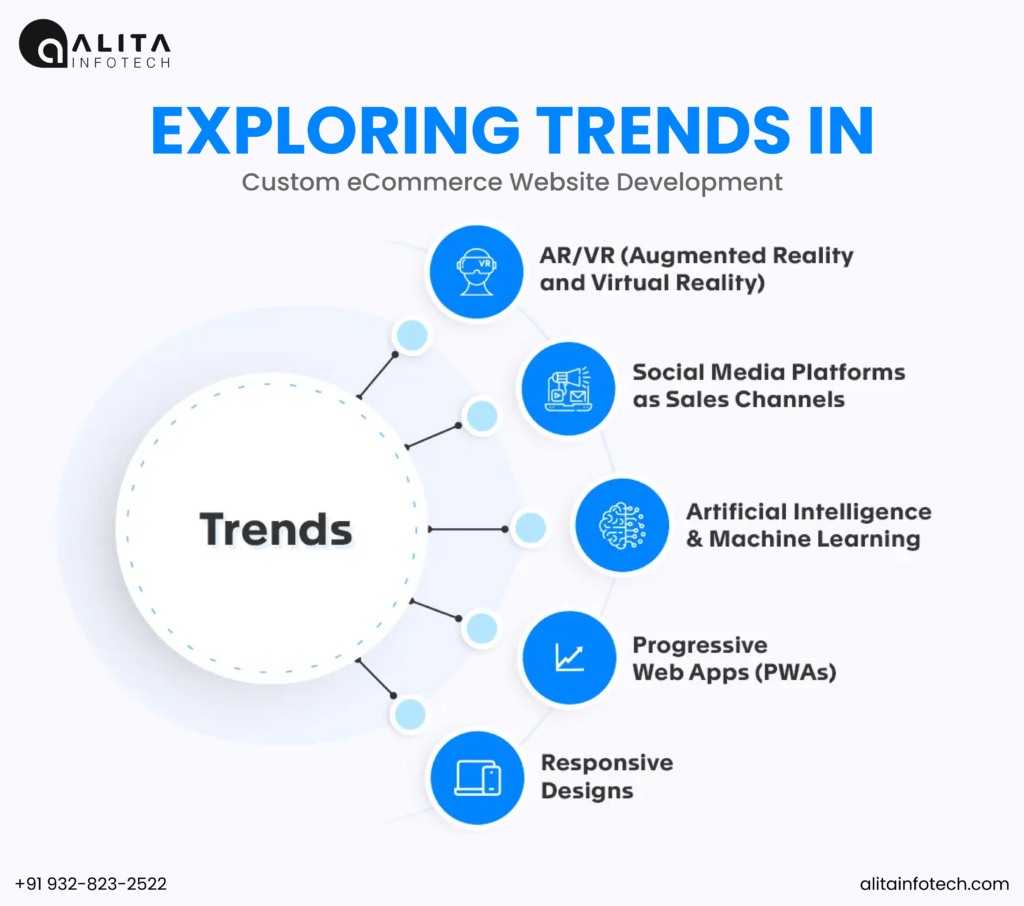
The e-commerce arena has borne witness to various trends, from the surge in mobile commerce to the proliferation of social media marketing and the dawn of voice commerce. As we march into 2023, these trends persist, albeit with a pronounced focus on elevating personalized user experiences through custom eCommerce development.
Augmented Reality (AR) and Virtual Reality (VR): Elevating the Shopping Experience
Augmented Reality and Virtual Reality have emerged as pivotal trends in the realm of e-commerce, enhancing the shopping journey with interactive product visualization. These technologies empower customers to engage with products in a more immersive manner, ultimately refining the user experience.
Social Media Channels as E-commerce Avenues
The integration of social media platforms, including Facebook, Instagram, and Pinterest, as sales channels, remains a steadfast trend in 2023. The strategic utilization of shoppable posts and stories on these platforms provides businesses with a direct link to a broader audience, propelling sales and fostering consumer engagement.
Empowering Personalization with AI and ML
Artificial Intelligence and Machine Learning are harnessed to craft personalized user experiences by offering tailored product recommendations grounded in browsing and purchase history. This synergy between AI, ML, and eCommerce development results in a more engaging and pertinent shopping experience, fostering brand loyalty.
The Progressive Ascent of Progressive Web Apps (PWAs)
Progressive Web Apps (PWAs) are gaining momentum as a favored approach for businesses aspiring to deliver native app-like experiences on web platforms. These apps boast swifter loading times, offline functionality, and push notifications, making them a prime choice for seamless user experiences across all devices.
Responsive Designs: Crucial in the Mobile-First Era
Responsive design stakes its claim as an indispensable facet of e-commerce, particularly in the era dominated by mobile devices for online shopping. An imperative to ensure a consistent user experience across devices, responsive design is paramount in widening the reach of businesses and maintaining user satisfaction.
Benefits of Embracing Custom eCommerce Website Development
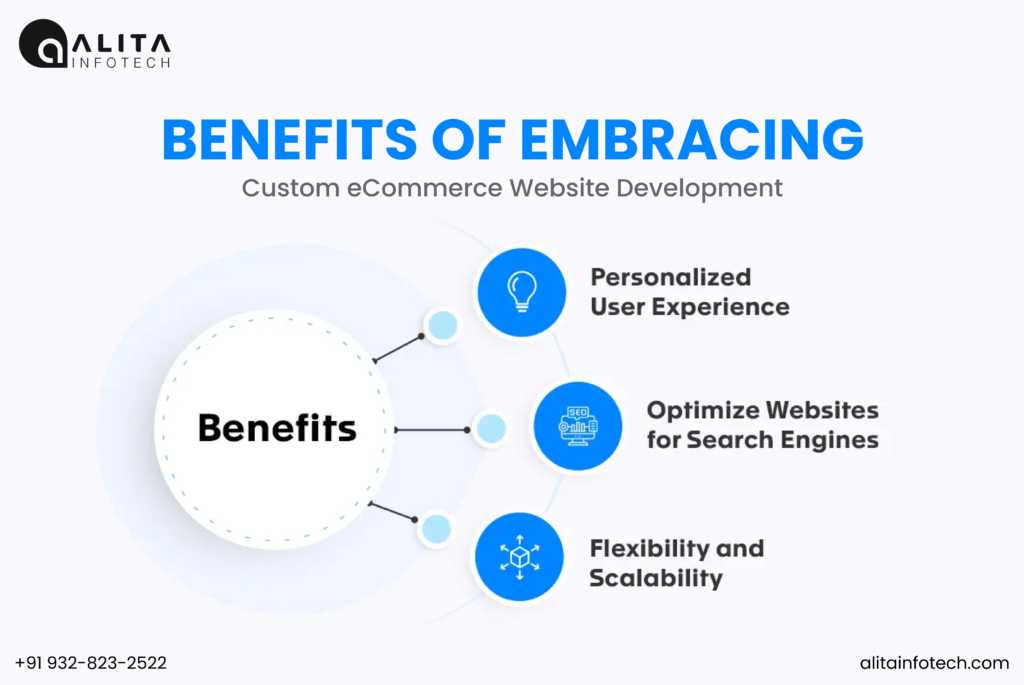
Crafting Distinct Personalized Journeys
Custom websites empower businesses to weave personalized journeys for users, setting them apart in a competitive market. These tailor-made platforms engender seamless user experiences that resonate, driving elevated engagement and conversion rates.
SEO Optimization Made Effortless
Custom websites streamline the process of eCommerce website optimization, aligning seamlessly with SEO strategies. Such optimization culminates in higher search engine result page rankings, amplifying visibility and drawing increased organic traffic, which in turn drives sales and revenue.
Flexibility and Scalability
A cornerstone of custom eCommerce website development lies in its inherent flexibility and scalability, transcending the confines of pre-designed templates. This adaptability enables businesses to infuse novel functionalities and features, ensuring alignment with evolving needs without fretting over compatibility issues, thereby fostering cost-effective solutions.
Unfolding Technologies in Custom eCommerce Website Development
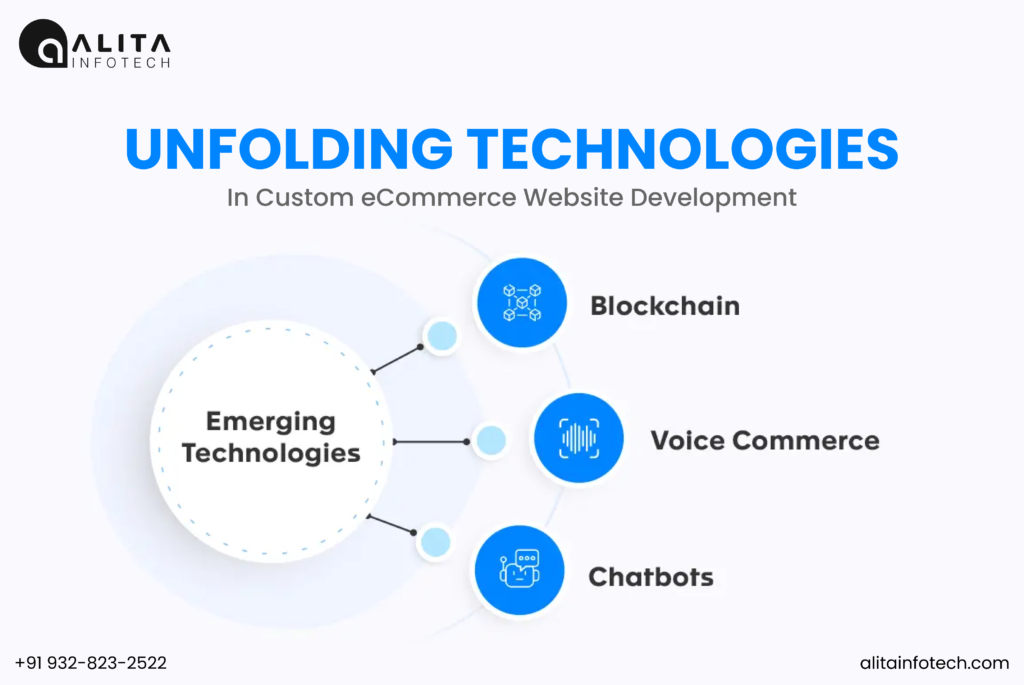
Blockchain: Pioneering Security and Transparency
Blockchain technology serves as a bulwark, fortifying e-commerce transactions with heightened security and transparency, thereby nurturing trust between businesses and customers.
Voice Commerce: A Harmonious Synergy
The realm of voice commerce is expanding, harmonizing with the integration of voice assistants such as Amazon Alexa and Google Assistant into e-commerce platforms. This convergence furnishes customers with the convenience of voice-driven product exploration and purchase, cultivating an enhanced shopping experience.
Chatbots: Instantaneous Customer Support
Chatbots take center stage in delivering real-time customer support, reducing the dependence on dedicated support teams. These virtual assistants swiftly address customer queries, endowing personalized interactions that propel satisfaction and engender loyalty.
Putting the Customer First in eCommerce Design and Development
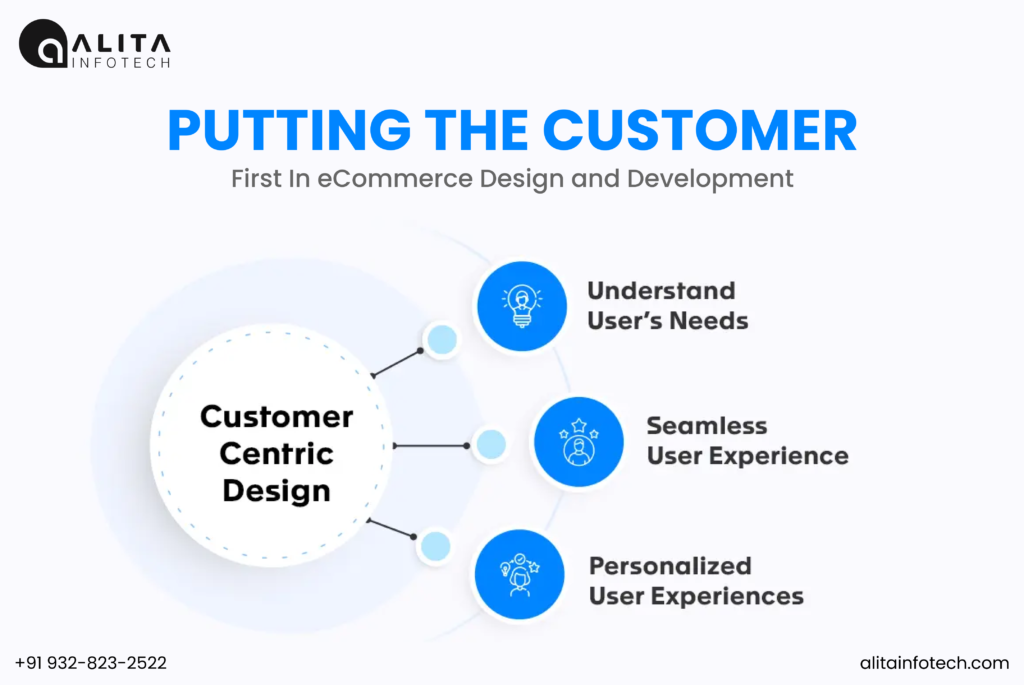
Customer-Centric Philosophy in eCommerce
The crux of triumphant eCommerce website development lies in placing the customer at the heart of the design and development process, a principle masterfully executed through custom eCommerce website design.
Understanding User Needs
Unveiling the essence of user preferences is paramount, guiding the creation of a website characterized by an intuitive layout, high-quality visual assets, and optimized loading times, culminating in a user-centric interface.
Seamless User Experience
Custom websites are meticulously crafted to foster a seamless user experience across a diverse array of devices, seamlessly integrating responsive design, optimizing multimedia for mobile devices, and facilitating intuitive navigation.
Personalization: A Catalyst for Engagement
Personalized user experiences emergex as a pivotal facet, orchestrated through tactics like product recommendations, abandoned cart reminders, and bespoke emails. This orchestration ignites heightened engagement and conversion rates, fueling sales and revenue growth.
Mastering Best Practices for Custom eCommerce Website Development
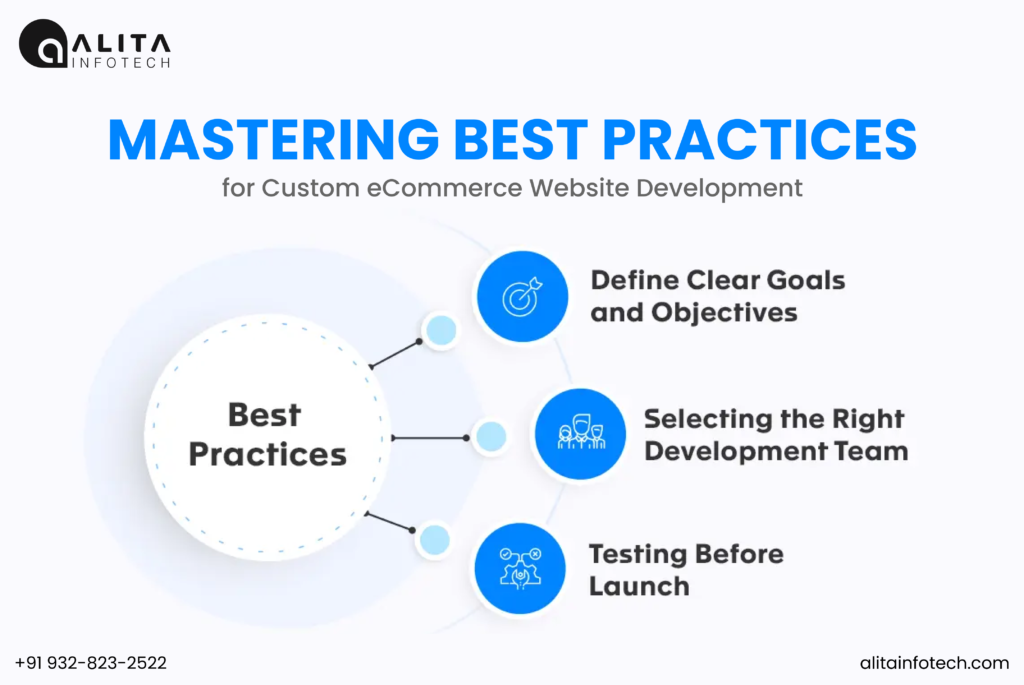
Navigating the Complexities of eCommerce Development
The art of eCommerce website development entails a comprehensive approach, demanding strategic planning and meticulous execution of best practices to ensure success.
Defining Clear Objectives
Clarifying objectives serves as a cornerstone, defining the trajectory of a successful e-commerce endeavor. Identifying the target audience, articulating unique selling propositions (USPs), and establishing realistic traffic and sales goals are imperative for a well-structured foundation.
Selecting the Right Development Team
The selection of an adept development team holds paramount significance, as they sculpt the manifestation of your vision into reality. Opt for a team adept in crafting custom websites, equipped with the requisite skills and expertise to seamlessly align with your unique requirements.
Pre-launch Testing: A Crucial Litmus Test
Thorough pre-launch testing is non-negotiable, safeguarding against bugs and glitches that could mar the user experience. Rigorous testing across devices and browsers, coupled with meticulous SEO optimization, ensures a polished, glitch-free launch.
The Art of Choosing the Perfect eCommerce Development Team
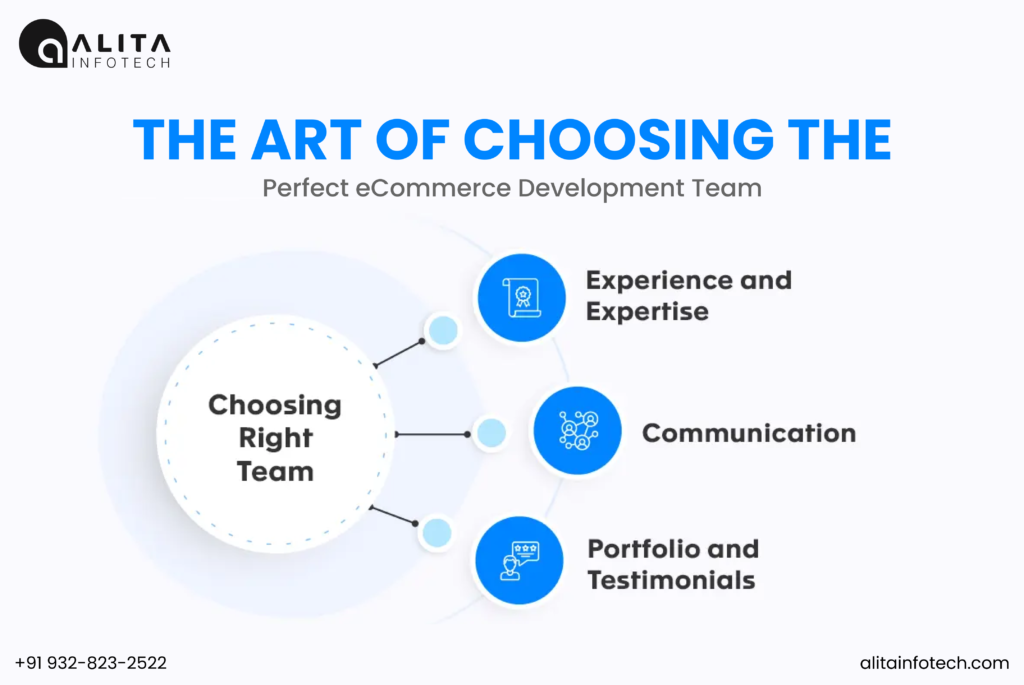
Choosing the Ideal eCommerce Developer Team
Evaluating potential eCommerce developer teams requires a careful assessment of various factors, as they play a pivotal role in actualizing your business aspirations.
Experience and Proficiency
Prioritize teams with a track record of building successful eCommerce websites, ideally having worked with platforms akin to your intended one. Additionally, their prowess in website design, development, and eCommerce functionality is paramount.
Effective Communication
The hallmark of a reliable team is their prowess in effective communication, characterized by clear, prompt, and attentive dialogue. Seek out teams that exhibit availability and responsiveness, a testament to their dedication to meeting your needs.
Portfolio and Testimonials: A Glimpse of Excellence
Delve into the team’s portfolio and peruse client testimonials to gauge their performance and outcomes. Look for case studies showcasing their ability to engineer successful eCommerce platforms, offering insights into their suitability for your business.
Future-Proofing Your Custom eCommerce Venture

Staying Ahead of the eCommerce Curve
As the e-commerce landscape continues its evolution, the concept of future-proofing custom websites emerges as an imperative strategy. Embrace scalable technologies like cloud computing and microservices architecture, continually adapt to emerging trends, and regularly update your website to ensure an uninterrupted user experience.
Addressing Common Queries for eCommerce Business Owners
Building an eCommerce Website from Scratch
Crafting an eCommerce website from scratch involves a step-by-step approach. Begin by selecting a unique domain name, followed by choosing a fitting content management system (CMS) or site builder. Select an eCommerce theme that resonates with your brand, add compelling product visuals and descriptions, create additional pages, and establish secure payment processing mechanisms. To market your products effectively, establish a social media presence, leverage SEO keywords, and contemplate paid advertising.
Calculating the Cost of an eCommerce Website
The financial investment required for building an eCommerce website from scratch varies significantly, ranging from modest to substantial sums. Factors influencing cost include domain name acquisition, web hosting, and the chosen platform.
Navigating the Timeline for eCommerce Website Development
The timeline for eCommerce website development hinges on variables such as the website’s complexity and requisite features. A comprehensive process encompassing information gathering, planning, content creation, design, development, testing, and launch necessitates careful time allocation for each stage. While the impulse to hasten the process is understandable, launching a Minimum Viable Product (MVP) for your custom eCommerce website, followed by iterative improvements based on user feedback, is recommended for optimum results.
In Conclusion
E-commerce’s horizon is bathed in the glow of potential, ready to be harnessed through the judicious use of emerging technologies. The key lies in a harmonious blend of expertise and technology, encapsulated by a proficient eCommerce developer team. Armed with the right resources, businesses can create an online haven that not only propels sales but also cultivates substantial growth.